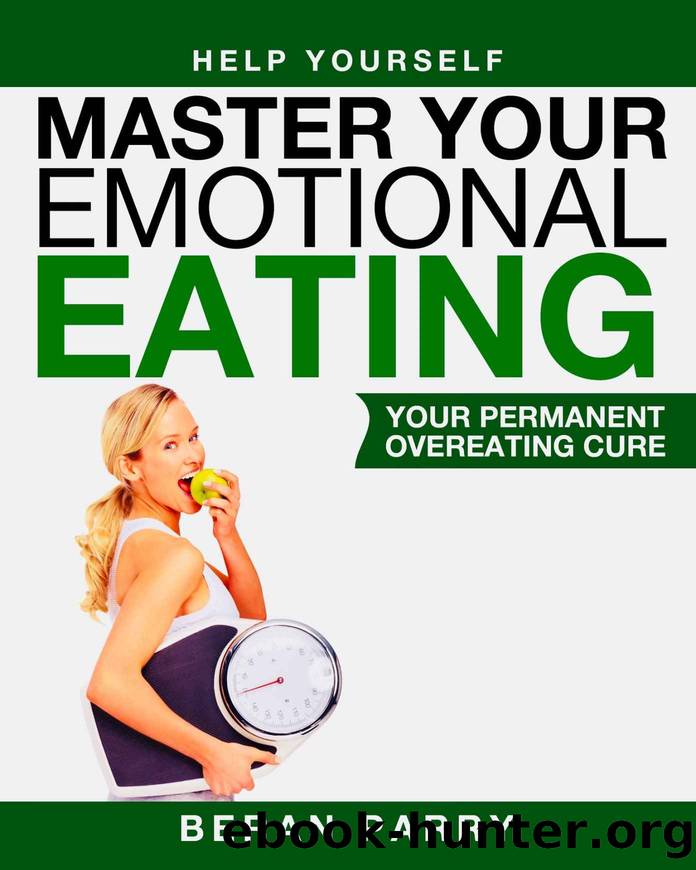Help Yourself: Master Your Emotional Eating: Your Permanent Overeating Cure by Beran Parry

Author:Beran Parry [Parry, Beran]
Language: eng
Format: mobi
Publisher: OneLifeWellbeing
Published: 2018-01-09T16:00:00+00:00
Chapter 8
Breaking free from the bad stuff
Most of our lives are experienced through habits. Habits make life easier because they save us from having to make unnecessary, repetitive decisions. We don't have to re-learn important and sometimes critical lessons because the information becomes ingrained in our habits and into our view of the world. So, we learn to respond to the environment around us with a set of programmed responses. These are habits.
Many habits are deeply associated either with pain or with pleasure. We avoid things that might be unpleasant and pursue experiences that we associate with pleasure. Sometimes the message gets confused. The things that can seem to be pleasurable - like smoking, alcohol, drugs, the wrong food - are harming us. But can we change those habits and conditioned responses?
The latest research in the field of cognitive behaviour suggests that we most certainly can. We know that some habits are a product of chemical addictions, a dependence on substances that create powerful urges in our bodies and demand instant satisfaction.
We're going to take a look at those substances shortly. But one of the reasons why re-hab fails so often to 'cure' people of their addictions is that the individual must want to be free of the addiction in the first place.
Having the right motivation can make the world of difference and finding that motivation is a key element in changing our habits, developing new behaviours and building the foundations for complete wellness.
Ask any dieter and they'll tell you that the moment of temptation peaks when the refrigerator door opens or when the dessert trolley is wheeled into view! The latest research in cognitive behaviour suggests that the problem is not in the temptation itself but in how the mind perceives the object of desire.
It seems that the prefrontal cortex, when engaged to deal with any source of temptation, can be incredibly creative in offering different ways of perceiving the source of the challenge. This diminishes the urge to give in and indulge the craving. It does not require some superhuman effort of will. It requires practice, persistence and a degree of determination. Yes, I know. These ideas do not resonate very easily in an age of instant gratification. If we're being brutally objective, it seems that our culture has lost touch with the concepts of self-discipline, self-control and self-mastery.
Ancient cultures promoted these ideals as the worthiest expressions of human potential, but they appear almost meaningless today. Discipline is perhaps wrongly associated with complete denial and abstinence and it's too easy to polarise the argument and imagine that we must either have total and absolute self-control, denying ourselves everything that might be interpreted as pleasurable, or lapse into some hedonistic abyss of self-indulgence!
Self-control really does provide enormous benefits to the individual but certainly not to the extreme point of complete self-denial. Self-control enables us to enjoy things selectively. We are free to enjoy our appetites rather than be the slaves of our cravings. When you identify the things that
Download
This site does not store any files on its server. We only index and link to content provided by other sites. Please contact the content providers to delete copyright contents if any and email us, we'll remove relevant links or contents immediately.
Potatoes Not Prozac by Kathleen DesMaisons(349)
Breaking Free from Emotional Eating by Geneen Roth(348)
Help Yourself: Master Your Emotional Eating: Your Permanent Overeating Cure by Beran Parry(308)
Artful Eating by Karina Melvin(300)
Intuitive Eating for Every Day by Evelyn Tribole(275)
Gastric Band Hypnosis for Rapid Weight Loss: Avoid the Risk of Gastric Band Surgery, Burn Fat, and Get Rid of a Food Addiction and Emotional Eating With Affirmations, Meditations, and Self-Hypnosis by Melanie Taylor(263)
Overeating and Binge Eating Beating Emotional Eating The Easy Way by Speedy Publishing(262)
Get Moving! by Shwetambari Shetty(260)
Stories of Extreme Picky Eating by Jennifer Friedman(233)
Gastric Band Hypnosis for Rapid Weight Loss: Avoid the Risk of Gastric Band Surgery, Burn Fat, and Get Rid of a Food Addiction and Emotional Eating with ... You Burn Fat & Increase Your Confidence) by Melanie Taylor(220)
